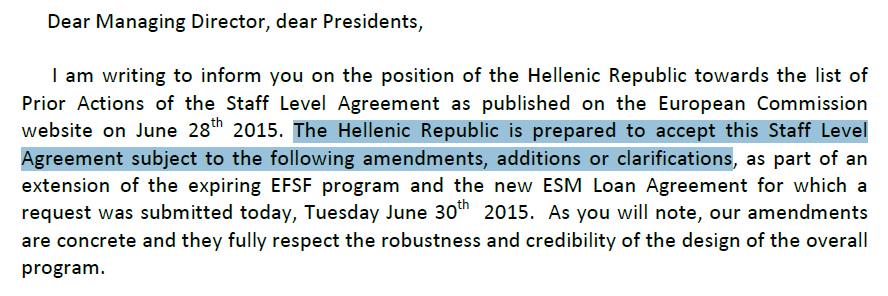Tuesday 30 June 2015, 15h35 : La Grèce propose un accord de financement sur deux ans
La Grèce a proposé mardi à ses créanciers de conclure avec le Mécanisme européen de stabilité (MES) un accord sur 2 ans permettant de couvrir ses besoins financiers tout en restructurant sa dette, a indiqué le bureau du Premier ministre Alexis Tsipras.
Le gouvernement explique « rester à la table des négociations » en dépit de l’organisation dimanche d’un référendum sur les discussions avec les créanciers.
Tuesday 30 June 2015 15.32 - "Greece proposes two-year debt restructure with EU"
Greece has submitted to creditors a new two-year aid proposal calling for parallel debt restructuring, the office of Prime Minister Alexis Tsipras has said, in what seemed like a last-ditch effort by Athens to resolve an impasse with lenders.
The statement came hours before Athens was set to default on a loan to the International Monetary Fund. It was unclear how creditors would respond.
"The Greek government proposed today a two-year deal with the ESM (European Stability Mechanism) to fully cover its financial needs and with parallel debt restructuring," the government said in a statement.
"Greece remains at the negotiating table," the statement said, adding that Athens would always seek a "viable solution to stay in the euro."
Wednesday 1 July 2015, 10:44. And here the news of this morning, on Wednesday, in Le Monde - L"Athènes pourrait annuler le référendum en échange de concessions sur la dette grecque" :
Le premier ministre grec, Alexis
Tsipras, est-il prêt à abandonner son projet de référendum du 5 juillet
sur les propositions des créanciers de la Grèce si l’Eurogroupe décidait
de répondre positivement à ses nouvelles demandes d’aide financière,
comme le laissaient entendre, mardi soir, certaines sources
européennes ?
L’intéressé, à ce stade, n’a donné aucune indication. Mais, selon nos informations, son bras droit, le ministre des finances, Yanis Varoufakis, qui maintenait jusque-là une ligne très dure, a proposé de revenir sur la décision d’organiser un référendum contre des concessions des créanciers concernant la dette grecque. Un coup de poker qui pourrait changer la donne, alors que les ministres des finances de la zone euro doivent se retrouver mercredi à 17 h 30 pour une nouvelle réunion de l’Eurogroupe consacrée au dossier grec.
The Wednesday (12:53) latest news
Wednesday 1 July 2015, 12:53 - "Grèce: vers un accord Tsipras/UE avant le référendum?"
L’intéressé, à ce stade, n’a donné aucune indication. Mais, selon nos informations, son bras droit, le ministre des finances, Yanis Varoufakis, qui maintenait jusque-là une ligne très dure, a proposé de revenir sur la décision d’organiser un référendum contre des concessions des créanciers concernant la dette grecque. Un coup de poker qui pourrait changer la donne, alors que les ministres des finances de la zone euro doivent se retrouver mercredi à 17 h 30 pour une nouvelle réunion de l’Eurogroupe consacrée au dossier grec.
The Wednesday (12:53) latest news
Wednesday 1 July 2015, 12:53 - "Grèce: vers un accord Tsipras/UE avant le référendum?"











